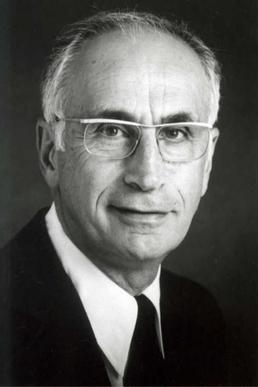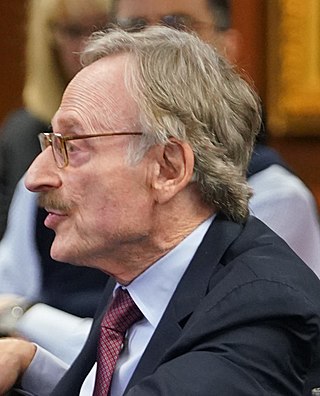
Friedrich August von Hayek, often referred to by his initials F. A. Hayek, was an Austrian-British economist and political philosopher who made contributions to economics, political philosophy, psychology, intellectual history, and other fields. Hayek shared the 1974 Nobel Memorial Prize in Economic Sciences with Gunnar Myrdal for work on money and economic fluctuations, and the interdependence of economic, social and institutional phenomena. His account of how prices communicate information is widely regarded as an important contribution to economics that led to him receiving the prize.

Milton Friedman was an American economist and statistician who received the 1976 Nobel Memorial Prize in Economic Sciences for his research on consumption analysis, monetary history and theory and the complexity of stabilization policy. With George Stigler, Friedman was among the intellectual leaders of the Chicago school of economics, a neoclassical school of economic thought associated with the work of the faculty at the University of Chicago that rejected Keynesianism in favor of monetarism until the mid-1970s, when it turned to new classical macroeconomics heavily based on the concept of rational expectations. Several students, young professors and academics who were recruited or mentored by Friedman at Chicago went on to become leading economists, including Gary Becker, Robert Fogel, and Robert Lucas Jr.

Reaganomics, or Reaganism, were the neoliberal economic policies promoted by U.S. President Ronald Reagan during the 1980s. These policies are characterized as supply-side economics, trickle-down economics, or "voodoo economics" by opponents, while Reagan and his advocates preferred to call it free-market economics.

The Hoover Institution is an American public policy think tank which promotes personal and economic liberty, free enterprise, and limited government. While the institution is formally a unit of Stanford University, it maintains an independent board of overseers and relies on its own income and donations. It is widely described as conservative, although its directors have contested the idea that it is partisan.

Armen Albert Alchian was an American economist. He spent almost his entire career at the University of California, Los Angeles (UCLA). A major microeconomic theorist, he is known as one of the founders of new institutional economics and widely acknowledged for his work on property rights.

Douglas Bandow is an American political writer working as a Senior Fellow at the Cato Institute. In 2005, Bandow was forced to resign from the Cato Institute after it was revealed that for over ten years, he accepted payments in exchange for publishing articles favorable to various clients. Bandow referred to the activities as "a lapse of judgment" and said that he accepted payments for "between 12 and 24 articles," each article costing approximately $2,000. Bandow was subsequently allowed to return to the Cato Institute.

Mark Thornton is an American economist of the Austrian School. He has written on the topic of prohibition of drugs, the economics of the American Civil War, and the "Skyscraper Index". He is a Senior Fellow with the Ludwig von Mises Institute in Alabama and a Research Fellow with the Independent Institute.
Bruce Reeves Bartlett is an American historian and author. He served as a domestic policy adviser to Ronald Reagan and as a Treasury official under George H. W. Bush. Bartlett also writes for the New York Times Economix blog.
Robert L. Bradley Jr. is CEO and founder of the Institute for Energy Research (IER). An expert in the history and political economy of energy and energy corporations, Bradley is a senior fellow at the American Institute for Economic Research (AIER), as well as Energy and Climate Change fellow of the Institute of Economic Affairs in London.

Michael Jay Boskin is the T. M. Friedman Professor of Economics and senior fellow at Stanford University's Hoover Institution. He also is chief executive officer and president of Boskin & Co., an economic consulting company.

William Arthur Niskanen was an American economist. He was one of the architects of President Ronald Reagan's economic program and contributed to public choice theory. He was also a long-time chairman of the Cato Institute, a libertarian think-tank.

Arnold Kling is an American economist, scholar, and blogger known for his writings on EconLog, an economics blog, along with Bryan Caplan and David R. Henderson. Kling also has his own blog, askblog, which carries the motto: "taking the most charitable views of those who disagree." The "ask" in askblog stands for "Arnold S. Kling." He is an Adjunct Scholar for the Cato Institute and is affiliated with the Mercatus Center.

Martin Anderson was an American academic, economist, author, policy analyst, and adviser to US politicians and presidents, including Ronald Reagan and Richard Nixon. Under the Nixon administration, Anderson was credited with helping to end the military draft and creating the all-volunteer armed forces. Under Reagan, Anderson helped draft the administration’s original economic program that became known as “Reaganomics.” A political conservative and a strong proponent of free-market capitalism, he was influenced by libertarianism and opposed government regulations that limited individual freedom.
John Howland Cochrane is an American economist who has served as the Rose-Marie and Jack Anderson Senior Fellow at the Hoover Institution since 2015. A specialist in financial economics and macroeconomics, he has been a professor of finance and economics by courtesy at the Stanford Graduate School of Business since 2016. From 1994 to 2015, he served as the AQR Capital Management Distinguished Service Professor of Finance at the University of Chicago Booth School of Business.
Richard Lyndell Stroup (1943-2021) was a free-market environmentalist and emeritus professor of economics at both North Carolina State University and Montana State University. He was co-founder of the Property and Environment Research Center (PERC) and a senior fellow. He was also a research fellow at the Independent Institute, adjunct scholar of the Cato Institute, and a member of the Mont Pèlerin Society. At Montana State University, he served as head of the Department of Agricultural Economics & Economics from 2003 to 2006. Stroup was director of the Office of Policy Analysis in the U.S. Department of the Interior from 1982 to 1984.

Scott B. Sumner is an American economist. He was previously the Director of the Program on Monetary Policy at the Mercatus Center at George Mason University, a Research Fellow at the Independent Institute, and a professor at Bentley University in Waltham, Massachusetts. His economics blog, The Money Illusion, popularized the idea of nominal GDP targeting, which says that the Federal Reserve and other central banks should target nominal GDP, real GDP growth plus the rate of inflation, to better "induce the correct level of business investment".

Thomas MacGillivray Humphrey was an American economist. Until 2005 he was a research advisor and senior economist in the research department of the Federal Reserve Bank of Richmond and editor of the bank's flagship publication, the Economic Quarterly. His publications cover macroeconomics, monetary economics, and the history of economic thought. Mark Blaug called him the "undisputed master" of British classical monetary thought.

David I. Meiselman was an American economist. Among his contributions to the field of economics are his work on the term structure of interest rates, the foundation today of the implementation of monetary policy by major central banks, and his work with Milton Friedman on the impact of monetary policy on the performance of the economy and inflation.
Michael David Bordo is a Canadian and American economist, currently Board of Governors Professor of Economics and Distinguished Professor of Economics at Rutgers University. He is a research associate at the National Bureau of Economic Research as well as a Distinguished Visiting Fellow at the Hoover Institution at Stanford University. He is the third most influential economic historian worldwide according to the RePEc/IDEAS rankings. He was a student of Milton Friedman and has co-authored numerous books and articles with Anna Schwartz.














